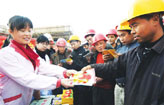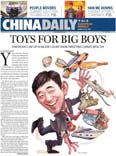Economy
Forex reserves to expand at slower pace
Updated: 2011-04-16 14:36
(Xinhua)
BEIJING - China's analysts said that the country's foreign exchange reserves will expand at a slower pace as its structure of foreign trade becomes increasingly balanced.
China's foreign exchange reserves hit a historic high of $3.04 trillion by the end of March, representing an increase of 24.4 percent year on year, the People's Bank of China (PBOC), its central bank, said Thursday in a statement.
Strong economic growth fueled reserves boost
From the beginning of China's reform and opening up in 1978 to 2000, China's foreign exchange reserves experienced slow and unsteady growth. By the end of 2000, the reserves figure stood at just $166 billion.
The rapid reserves expansion began in 2001, since then the reserves figure has maintained strong, double-digit annual growth.
In October 2006, the figure crossed the threshold of $1 trillion for the first time. In less than three years, the figure had doubled by June 2009.
Guo Tianyong, a professor with the Central University of Finance and Economics, told Xinhua on Thursday that the rapid reserves growth was closely related to the country's galloping economic growth.
China's trade surplus and foreign direct investment have maintained strong momentum in past years, and the anticipation of a strengthening yuan and relatively high interest rates in China have attracted an increasing amount of international speculative capital, or hot money, leading to stronger reserves growth, according to Guo.
China's State Administration of Foreign Exchange (SAFE) announced in a report released in February that $35.5 billion of hot money had flowed into the country in 2010, accounting for 7.6 percent of the increase in its foreign reserves for that year.
"Capital inflows from overseas were in accordance with the real economy's fundamental situations, despite small amounts of illegal hot money inflows," the SAFE said.
Pace to moderate as trade structure optimizes
Guo Tianyong expected the country's rapid reserves growth to slow down, as the country's trade surplus this year will narrow further after dropping for two years in a row.
China's foreign trade is steering toward a more balanced direction. Its trade surplus has dropped for two consecutive years.
Data from the General Administration of Customs (GAC) showed that China saw a trade deficit of $1.02 billion from January to March this year, the first quarterly trade deficit in six years.
Zhuang Jian, a senior economist with the Asian Development Bank, echoed Guo's view, saying that the growth rate may drop with the optimization of China's foreign trade.
"Although there were some seasonal factors contributing to the trade deficit in the first quarter, we can clearly see that China is actively implementing the policy of stabilizing exports and boosting imports," said Zhuang.
Countering side effects of massive reserves
Ample foreign reserves have enhanced China's capability of countering the impact of hot money and boosting its economic strength, but the ample reserves have also come with some negative effects.
Zhuang said that the central bank has to buy foreign exchanges with its local currency, the yuan, resulting in the massive increase of funds outstanding for foreign exchange.
This will then add to the country's inflationary pressures, he said.
China's funds outstanding for foreign exchange surged 90.15 percent month on month to 407.91 trillion yuan in March, with growing inflows of foreign currencies through exports and foreign investment, according to the central bank.
Foreign exchange authorities also face a tough problem in maintaining and increasing the value of the massive foreign reserves on hand.
| ||||
The management of such a large amount of reserves is constrained by not only the market capacity but also the attitude of the investments' host country, said Yi Gang, vice governor of China's central bank.
"We are facing great challenges in investing our foreign reserves, and it is high time for us to improve the reserves management system," said Yi.
Guo Tianyong suggested that the foreign exchange authority promote the efficiency of utilizing the reserves on hand and further diversify investment channels.
"It's more important to accelerate domestic economic restructuring and make our international payment more balanced. Meanwhile, China should seek to make its yuan an international currency, and gradually make the yuan convertible under the capital account," according to Zhuang Jian.
E-paper

Han me downs
Traditional 3,000-year-old clothes are making a comeback.
Reaching out
Fast growth fuels rise in super rich
Chinese tourists spend more
Specials

Big spenders
More mainland tourists are expected to spend money on overseas travel this year.

Rise in super rich
Report cites rising property prices, gdp as key drivers of increasing number of chinese millionaires.

Reaching out
Condom makers are stepping up their presence in smaller cities to boost sales




